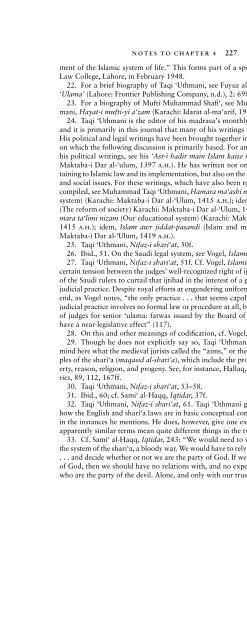Download (1 MB) - Islam and Christian-Muslim Relations: Articles ...
Download (1 MB) - Islam and Christian-Muslim Relations: Articles ...
Download (1 MB) - Islam and Christian-Muslim Relations: Articles ...
Create successful ePaper yourself
Turn your PDF publications into a flip-book with our unique Google optimized e-Paper software.
NOTES TO CHAPTER 4 227ment of the <strong>Islam</strong>ic system of life.” This forms part of a speech delivered at theLaw College, Lahore, in February 1948.22. For a brief biography of Taqi ‘Uthmani, see Fuyuz al-Rahman, Mashahir‘Ulama’ (Lahore: Frontier Publishing Company, n.d.), 2: 698–700.23. For a biography of Mufti Muhammad Shafi‘, see Muhammad Rafi‘ ‘Uthmani,Hayat-i mufti-yi a‘zam (Karachi: Idarat al-ma‘arif, 1994).24. Taqi ‘Uthmani is the editor of his madrasa’s monthly journal, al-Balagh,<strong>and</strong> it is primarily in this journal that many of his writings were first published.His political <strong>and</strong> legal writings have been brought together in his Nifaz-i shari‘at,on which the following discussion is primarily based. For an earlier collection ofhis political writings, see his ‘Asr-i hadir main <strong>Islam</strong> kaise nafidh ho? (Karachi:Maktaba-i Dar al-‘ulum, 1397 A.H.). He has written not only on questions pertainingto <strong>Islam</strong>ic law <strong>and</strong> its implementation, but also on the economy, education,<strong>and</strong> social issues. For these writings, which have also been recently collected <strong>and</strong>compiled, see Muhammad Taqi ‘Uthmani, Hamara ma‘ashi nizam (Our economicsystem) (Karachi: Maktaba-i Dar al-‘Ulum, 1415 A.H.); idem, Islah-i mu‘ashara(The reform of society) Karachi: Maktaba-i Dar al-‘Ulum, 1415 A.H.); idem, Hamarata‘limi nizam (Our educational system) (Karachi: Maktaba-i Dar al-‘Ulum,1415 A.H.); idem, <strong>Islam</strong> awr jiddat-pas<strong>and</strong>i (<strong>Islam</strong> <strong>and</strong> modernism) (Karachi:Maktaba-i Dar al-‘Ulum, 1419 A.H.).25. Taqi ‘Uthmani, Nifaz-i shari‘at, 50f.26. Ibid., 51. On the Saudi legal system, see Vogel, <strong>Islam</strong>ic Law.27. Taqi ‘Uthmani, Nifaz-i shari‘at, 51f. Cf. Vogel, <strong>Islam</strong>ic Law, 83–117, on acertain tension between the judges’ well-recognized right of ijtihad <strong>and</strong> the effortsof the Saudi rulers to curtail that ijtihad in the interest of a greater uniformity ofjudicial practice. Despite royal efforts at engendering uniformity by decree, in theend, as Vogel notes, “the only practice . . . that seems capable of unifying Saudijudicial practice involves no formal law or procedure at all, but simply the respectof judges for senior ‘ulama: fatwas issued by the Board of Senior ‘Ulama’ thathave a near-legislative effect” (117).28. On this <strong>and</strong> other meanings of codification, cf. Vogel, <strong>Islam</strong>ic Law, 311f.29. Though he does not explicitly say so, Taqi ‘Uthmani appears to have inmind here what the medieval jurists called the “aims,” or the fundamental principlesof the shari‘a (maqasid al-shari‘a), which include the protection of life, property,reason, religion, <strong>and</strong> progeny. See, for instance, Hallaq, <strong>Islam</strong>ic Legal Theories,89, 112, 167ff.30. Taqi ‘Uthmani, Nifaz-i shari‘at, 53–58.31. Ibid., 60; cf. Sami‘ al-Haqq, Iqtidar, 37f.32. Taqi ‘Uthmani, Nifaz-i shari‘at, 61. Taqi ‘Uthmani gives no examples ofhow the English <strong>and</strong> shari‘a laws are in basic conceptual conflict with each otherin the instances he mentions. He does, however, give one example (62f.) of howapparently similar terms mean quite different things in the two legal systems.33. Cf. Sami‘ al-Haqq, Iqtidar, 243: “We would need to wage a great war forthe system of the shari‘a, a bloody war. We would have to rely on our own prowess. . . <strong>and</strong> decide whether or not we are the party of God. If we are indeed the partyof God, then we should have no relations with, <strong>and</strong> no expectations from, thosewho are the party of the devil. Alone, <strong>and</strong> only with our trust in the help of God,



